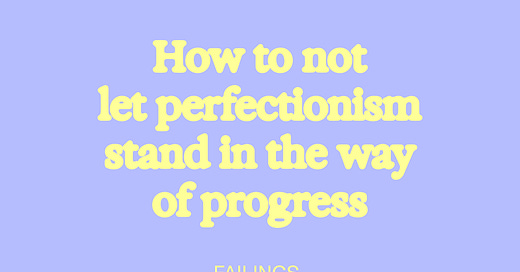Sometimes I fantasise about being an employee
And how to not let perfectionism stand in the way of progress.
When you’re the boss or in senior leadership roles, having a down day, or tapping out of the decision making isn’t really an option.
Entrepreneurship is often glamourised. Whilst being your own boss undoubtedly has its benefits, there’s also a lot to be said for being an employee.
I recently met a friend and colleague who holds a senior role at one of the biggest brands of our generation. She absolutely has the experience and ability to do her own thing – whether consulting or starting her own business. We discussed the pros and cons of each path, and what I admired most was her self-awareness - she has little desire to step away from employment, while I laughed at how unemployable I now feel after eight years of experiencing the flexibility that entrepreneurship brings.
How do you know if you’re cut out to be an entrepreneur?
Like most things in life, there’s no perfect option. What matters is finding the best fit for your personality, alongside the right environment - who you work with, where you are, and how the role makes you feel.
Consulting, for example, is a constant hustle, which I don’t think I’d cope with well. I’m also unsure if I’d enjoy having to run my decisions past someone else. But having your own company brings its own challenges, and sometimes I do find myself fantasising about what it would be like to relinquish those responsibilities and place my career in someone else’s hands.
The benefits of being employed
Being an employee often means a stable income but could also mean hitting an earning ceiling. You might have fewer responsibilities, focusing purely on your role, rather than the entire business. But when in charge, you can build a team around you and shape your working environment to align with your vision.
Work-life balance should, in theory, be easier as an employee. But when it’s not, it can feel frustrating - if you’re going above and beyond for something that isn’t your own.
Career growth and decision-making, as well as personal development is possible in any role, as long as you’re in the right environment. Yet, it’s easy to idealise the opposite scenario of the one you’re in. When you’re leading a business, your days are filled with decision-making - giving instructions, figuring out the best way forward, and often not having all the answers. The key difference is that experience teaches you how to make an informed guess. And when you’re the one in charge, there’s no room for indecision - progress depends on pushing forward, even in uncertainty.
My biggest learning? Perfectionism can stand in the way of progress. I’ve been guilty if it and I see it all the time - brands striving for the perfect outcome, only to get stuck in fear of making the wrong business decision. The reality is, most choices can be justified after the fact, even if they weren’t obvious at the start. And ultimately, success in business isn’t just about hard work or good ideas. Like it or not, I believe that an element of luck plays a role too.
5 ways to choose progress over perfection
Are you guilty of procrastination due to perfectionism? This might help…
1. Tell yourself that your 70% is good enough. That extra 30%? It’s just perfectionism standing in your way. 70% ready, means it’s good enough to launch, test or share.
2. Embrace iterations. If you are a perfectionist, chances are you’ll want to make changes in the future anyway - and you probably can. Getting something out there means you can learn, refine, and improve future versions rather than staying stuck in endless tweaking.
3. Set deadlines. I work well under pressure, so self-imposed deadlines help me progress, rather than getting stuck in endless revisions.
4. Try and see mistakes as lessons, not failures. I say “try” as this is the hardest one of them all. But most of the time you haven’t made a huge mistake – you probably just think something could have been better. Ask yourself: Was it actually wrong, or just not perfect? More often than not, you’ll realise it was completely fine.
5. Try and separate your professional successes with your personal worth. Again, another “try” but if you’re like me, then your success at work will be intertwined with your self-worth. But remind yourself that your value is based on simply showing up and doing your best, not making everything flawless.
To anyone reading this, thank you for being here, please ❤️ (below) if you enjoyed this piece, it really helps others find it.






Great advice :).. I'm loving employment right now